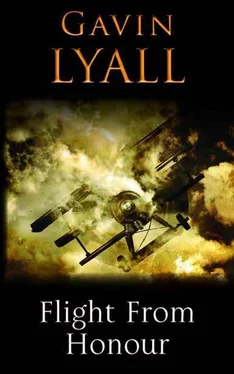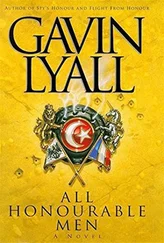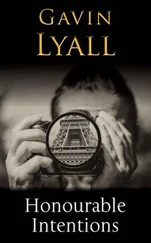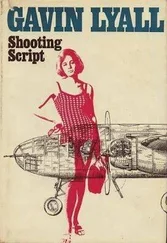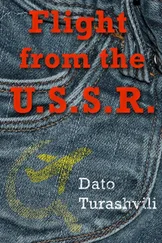Gavin Lyall - Flight From Honour
Здесь есть возможность читать онлайн «Gavin Lyall - Flight From Honour» весь текст электронной книги совершенно бесплатно (целиком полную версию без сокращений). В некоторых случаях можно слушать аудио, скачать через торрент в формате fb2 и присутствует краткое содержание. Год выпуска: 2013, Издательство: PFD Books, Жанр: Шпионский детектив, Исторический детектив, на английском языке. Описание произведения, (предисловие) а так же отзывы посетителей доступны на портале библиотеки ЛибКат.
- Название:Flight From Honour
- Автор:
- Издательство:PFD Books
- Жанр:
- Год:2013
- ISBN:нет данных
- Рейтинг книги:4 / 5. Голосов: 1
-
Избранное:Добавить в избранное
- Отзывы:
-
Ваша оценка:
- 80
- 1
- 2
- 3
- 4
- 5
Flight From Honour: краткое содержание, описание и аннотация
Предлагаем к чтению аннотацию, описание, краткое содержание или предисловие (зависит от того, что написал сам автор книги «Flight From Honour»). Если вы не нашли необходимую информацию о книге — напишите в комментариях, мы постараемся отыскать её.
Flight From Honour — читать онлайн бесплатно полную книгу (весь текст) целиком
Ниже представлен текст книги, разбитый по страницам. Система сохранения места последней прочитанной страницы, позволяет с удобством читать онлайн бесплатно книгу «Flight From Honour», без необходимости каждый раз заново искать на чём Вы остановились. Поставьте закладку, и сможете в любой момент перейти на страницу, на которой закончили чтение.
Интервал:
Закладка:
Gavin Lyall
Flight From Honour
1
The little fishing boat didn’t take shape in the dawn mist until long after the creak of its oars and the irregular slap of water had reached the shore. Then it gradually grew detail and colour as it scraped its way past bigger boats into Muggia’s inner harbour. Any watcher might have wondered why it was back so much later than other boats in the local fleet. However, nobody was bothering to watch, since everyone in the village knew it had paused to take on a Mysterious Stranger from an Italian ship in the Gulf. But the Stranger himself was city-bred and still believed he was on a Secret Mission as he stepped on to the fish-scaled and slippery quayside.
Although he was shivering with cold and damp, he still saw the huddled village as having the charm of a stage set. And indeed, if anybody had written an opera about fishermen of the North Adriatic, he could have taken the whole inner harbour, with its boats and cluttered quays, and fitted it onto the stage of La Scala. Only the tiny castle in the background and the narrow alleys leading off in all directions, and already beflagged with damp washing, would have needed to be painted on the backdrop.
One of the two fishermen led him through an arch and into a raucous cafe in the comer of the town hall. Five centuries of Austrian rule hadn’t much changed the Venetian buildings – there was still a carved Lion of St Mark set into the stonework above the cafe – nor the straight-nosed faces and brown hair of the inhabitants.
The Stranger was small, with dark lank hair, a thin sharp face and spectacles which he had continually to wipe clear in the steamy indoors warmth. Being Parisian, he asked for a large coffee and a cognac, which surprised the fisherman. On the other hand, the brandy he was given surprised the Stranger. Then everybody else politely didn’t notice as he surreptiously paid the fisherman for the voyage and was taken out to the road that ran around the bay and the shipbuilding yards into Trieste.
The Cafe San Marco was far larger but, in contrast with the deliberate Italian dignity of other big cafes in Trieste, had a comfortable Mittel-Europa sprawl. It could have been in any one of a dozen cities of the Austrian empire: Prague, Budapest, Salzburg or Sarajevo. Indeed, in that summer of 1913, many would have said that the rule of the Viennese cafe was stronger than that of the aged Emperor in Vienna. And they would have said it in just such a place, with its darkened gilt frescoes, marble and mirrors, among the old men playing chess, students doing their homework, writers writing, artists arguing and journalists reading themselves in the newspapers on cane frames handed round by the waiters. And two men who might have called themselves middle-aged doing nothing but talk as quietly as they could in a busy cafe at mid-morning.
The one with the bony, ascetic face and deep-set eyes was a count, a Venetian title equal to a marquis from anywhere else, or so Venetian counts said. He was dressed with dignified raffishness in a wide hat, floppy maroon bow-tie and a short light cape, whilst his delicate fingers with their jewelled rings constantly fondled a silver-topped cane.
Senator Giancarlo Falcone – who was using neither his rank nor his real name in Trieste – was shorter but strong and bulky in comparison with the Count’s apparent fragility. He had a large and hooked but very thin nose that could have looked sinister if it hadn’t been set in a reassuringly meaty face with prominent dark eyes and an easy smile. His crinkled hair was now white and thinning out, and while you would remember him as well dressed and groomed, you wouldn’t remember just how because it seemed impersonal. In the same way, he looked successful but not at anything that touched him deeply.
He looked at his wristwatch but all he said was: “I heard that they invented these for Santos-Dumont, the aviator.”
“Is that why you wear one?” The Count’s Italian was Triestine, Falcone’s Piedmontese, but they had no problem understanding each other.
“No.” Falcone gestured at his jacket, buttoned so high that it showed only a brief triangle of shirt behind his necktie. “How can I reach a proper watch under this?”
“You are a slave of fashion,” the Count observed.
“Perhaps,” Falcone said comfortably.
The Count sipped at the tiny coffee cup. Small delicate things seemed right for him; you couldn’t imagine him lifting a pint of beer. “I regret the passing of frock coats. Does anybody wear them nowadays?”
“In Italy, only royalty, diplomatists and the more corrupt of my colleagues. I regret them, too. But they need skilled cutting to hang properly at the back and should not be worn by anyone who hurries. Of course, in London you still see many.”
“Are you going there?”
Falcone nodded slowly. “Probably. Brussels first, but most likely I will find what we need in London. I could be there about the middle of September – do you yet know the date of the relief?”
“October the second.”
Falcone nodded. “Time enough. And your new friends – they will accept such gifts from you without suspicion?”
“I was talking only the other day with the Commandante, preparing the ground, arousing his interest . . . Ah, I believe this is the lad now.”
Falcone didn’t turn, he just watched the Count’s eyes watching over his shoulder. “He looks young,” the Count said. “Now he has seen Aldo’s magazine and carnation. He is going across . . . he introduces himself . . . he sits down . . . Aldo is summoning a waiter; how imperiously he does it. Servants are much better at grandeur than we poor aristocrats.”
“Is anybody following him?”
“As I said, they needn’t follow him in here: the waiters are all spies for the police or somebody.”
“Then why are we meeting here – like cafe conspirators?”
“Because the waiters in every other respectable cafe are spies, too. You can’t expect a good waiter to live on the sort of tips I give. And I am known to have been conspiring in here for twenty years: it would seem most suspicious if I were seen conspiring elsewhere.” He leant back and blew a delicate cloud of smoke that was immediately swirled away by the passing rush of a waiter. “Believe me, this is the only way; you’ve forgotten just what a small world Trieste is. But I’m not being flippant about the dangers. Not only from the Austrians, but now the Slovenes.”
“Slovenes? Those farmers from the Carso?”
“A little more, in these days. Now the Slovenes are given money to develop what they call their ‘folk arts’, and are favoured in recruiting for the police. So they hope to keep us Italians in our place and the Slovenes too busy to concoct their own plots. The Austrians can find a lazy way of doing anything, even govern an empire. But sometimes it works, so I beg you, take great care, particularly when you leave Trieste.”
“I shall be leaving this afternoon for Venice,” Falcone muttered, his unease back in full spate. “Now, can we get this settled . . . ?”
“You can look round now. He’s busy talking to Aldo.”
Falcone turned as if searching for a waiter and gave the Parisian a swift raking stare. “His clothes are a disgrace. Just looking at him, you’d know he crept ashore in a basket of fish.”
“You judge men too much by their clothes.”
“But the police judge men by the way they enter a country.”
“The boy knows nothing of our proposals, he’s merely to tell us if, and when, the Poet will be . . . available. And dealing with the Poet one has to accept a little flamboyant secrecy.” The Count lit a cigarette and fitted it into a long amber holder. “Did you hear the charade of his fleeing Paris, the first time he went to Arcachon? All midnight meetings and smuggling his trunks from hotel to hotel. It’s a wonder all Paris didn’t turn out to watch.”
Читать дальшеИнтервал:
Закладка:
Похожие книги на «Flight From Honour»
Представляем Вашему вниманию похожие книги на «Flight From Honour» списком для выбора. Мы отобрали схожую по названию и смыслу литературу в надежде предоставить читателям больше вариантов отыскать новые, интересные, ещё непрочитанные произведения.
Обсуждение, отзывы о книге «Flight From Honour» и просто собственные мнения читателей. Оставьте ваши комментарии, напишите, что Вы думаете о произведении, его смысле или главных героях. Укажите что конкретно понравилось, а что нет, и почему Вы так считаете.
